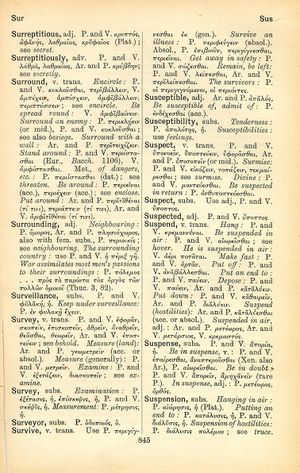surrounding: Difference between revisions
From LSJ
Ἐκ τῶν πόνων τοι τἀγάθ' αὔξεται βροτοῖς → Crescunt labore cuncta bona mortalibus → Das Gute wächst den Sterblichen aus ihrem Müh'n
(CSV5) |
m (Woodhouse1 replacement) |
||
| Line 1: | Line 1: | ||
{{Woodhouse1 | {{Woodhouse1 | ||
|Text=[[File:woodhouse_845.jpg|thumb|link={{filepath:woodhouse_845.jpg}}]] | |Text=[[File:woodhouse_845.jpg|thumb|link={{filepath:woodhouse_845.jpg}}]] | ||
===adjective=== | |||
[[neighbouring]]: [[prose|P.]] [[ὅμορος]], [[Aristophanes|Ar.]] and [[prose|P.]] [[πλησιόχωρος]], also with fem. subs., [[prose|P.]] [[περιοικίς]]; see [[neighbouring]]. | |||
[[the surrounding country]]: use [[prose|P.]] and [[verse|V.]] [[ἡ πέριξ γῆ]]. | |||
[[war assimilates most men's passions to their surroundings]]: [[prose|P.]] [[πόλεμος… πρὸς τὰ παρόντα τὰς ὀργὰς τῶν πολλῶν ὁμοιοῖ]] ([[Thucydides|Thuc.]] 3, 82). | |||
}} | }} | ||
Revision as of 08:53, 20 May 2020
English > Greek (Woodhouse)
adjective
neighbouring: P. ὅμορος, Ar. and P. πλησιόχωρος, also with fem. subs., P. περιοικίς; see neighbouring.
the surrounding country: use P. and V. ἡ πέριξ γῆ.
war assimilates most men's passions to their surroundings: P. πόλεμος… πρὸς τὰ παρόντα τὰς ὀργὰς τῶν πολλῶν ὁμοιοῖ (Thuc. 3, 82).

